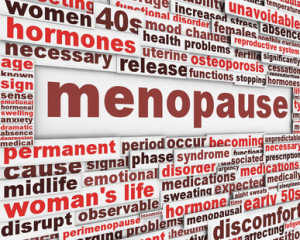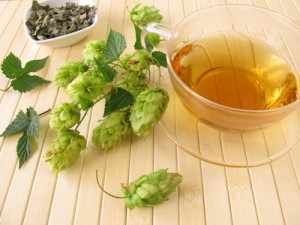Contents
How Amino Acids Can Help With Menopause
What you will learn
[success]
- The meaning and basic facts around menopause
- How the amino acid Arginine can reduce hot flushes
- How plant-based phytoestrogens can help in minimizing the negative side effects of menopause
- Why women during menopause must take Magnesium supplements
[/success]
Menopause, also referred to as ‘the change of life’, is a normal stage in a women’s life that marks the end of menstruation. This transition can take anywhere between 10 and 15 years and often starts during the mid-forties. Throughout menopause there are changes in hormone concentrations, with fewer estrogens released. Consequently bleeding each month becomes reduced until it stops completely. Menopause marks the date of the last menstrual period.
 Despite menopause being a natural phenomenon, hormone level changes can be very disruptive and cause a wide range of negative symptoms. Although menopause is different for everyone, classic symptoms include heart palpitations, vaginal dryness, hot flushes, dizziness and sweating. Some other common physical responses to lower hormone production include listlessness, headaches, weight gain, nervousness, and insomnia. There is also a higher risk of developing osteoporosis following menopause.
Despite menopause being a natural phenomenon, hormone level changes can be very disruptive and cause a wide range of negative symptoms. Although menopause is different for everyone, classic symptoms include heart palpitations, vaginal dryness, hot flushes, dizziness and sweating. Some other common physical responses to lower hormone production include listlessness, headaches, weight gain, nervousness, and insomnia. There is also a higher risk of developing osteoporosis following menopause.
One of the options for treating the symptoms of menopause is hormone replacement therapy (HRT) using chemicals that mimic estrogens. However, HRT is not without its own side effects and has been a topic of significant controversy. Prior to undergoing HRT, it’s very important to discuss your individual situation with a professional physician and investigate all options.
Proper nutrition and a healthy lifestyle can also be very beneficial for helping to relieve menopausal symptoms. Certain minerals and amino acids should be considered when progressing through menopause to help reduce negative side effects.
Reducing the occurrence of hot flushes with Arginine
Perhaps one of the most common complaints women have during menopause are hot flushes. This is a symptom of dilation or constriction of the blood vessels. In 2010 a study confirmed that in the early stages of menopause women have higher risks of endothelial dysfunction.
 During the research, 120 subjects were examined after the onset of menopause. The control group consisted of 24 women of similar age without signs of menopause
During the research, 120 subjects were examined after the onset of menopause. The control group consisted of 24 women of similar age without signs of menopause
1.
Women suffering from endothelial dysfunction exhibit poor circulation due to problems with vascular distance regulation. This causes what women commonly refer to as “hot flushes”. It’s reported to affect almost four out of five women throughout menopause. Previously considered as an annoying but harmless response, today scientists recognise that these symptoms have important consequences for cardiovascular functionality2.
The absence of sufficient dissolved nitric oxide (NO) is the cause of endothelial dysfunction. Consequently, arginine is very important. This non-essential amino acid is needed for the conversion into NO and vital for maintaining adequate concentrations of this important neutransmitter.
A good supply of arginine will support blood vessel elasticity and reduce the frequency of hot flushes. Many scientists believe that women should consider taking arginine supplements during menopause to reduce negative side effects such as hot flushes3.
Further supporting the effects of Arginine with Lysine supplementation
Lysine is an important amino acid that can reduce the body’s absorption of arginine into cells. Thus, a higher level of lysine can assist in increasing arginine concentrations within the blood plasma4, allowing faster conversion into nitric oxide5.
As an essential amino acid, lysine must be sourced from diet. It’s a key building block for a variety of important proteins that are vital during menopause. They include enzymes, hormones, antibodies, blood plasma transport proteins, and structural proteins within the muscles, bone, tendons and skin. Furthermore, lysine promotes calcium absorption within teeth and bones. Consequently, lysine is highly recommended for people that are at risk of developing osteoporosis6.
Minimizing weight gain with carnitine.
Comprised of the two essential amino acids, methionine and lysine, carnitine is an important biocarrier. It helps to support energy metabolism by governing long chain fatty acids through the inner mitochondrial membrane. Carnitine is also known as a powerful fat burner and important for weight management.
In 2013 a clinical study confirmed that motivational training combined with taking 500mg of carnitine daily can help to stimulate significant weight loss. After four weeks, obese subjects lost an average of 400g body fat and their waist circumference decreased by 1.3 cm. These results were achieved without making other changes to exercise and diet7.
Herbal hormone therapy using phytoestrogens.
 As an alternative to HRT or an additional treatment, phytoestrogens may be used. Many studies have shown that the intake of these plant hormones can be very helpful in minimizing the negative side effects of menopause8
As an alternative to HRT or an additional treatment, phytoestrogens may be used. Many studies have shown that the intake of these plant hormones can be very helpful in minimizing the negative side effects of menopause8
Phytoestrogens are common in a range of plants, including the Schisandra berry, green tea, the goji berry, flax seed and hops.
However, the concentrations of these plant hormones are typically low and taken in their natural form will not be effective enough to remedy some of the negative side effects of menopause. Thus, practitioners will often recommend suitable natural supplements with concentrated phytoestrogens9.
Sufficient magnesium is essential
Research has shown that an adequate supply of magnesium is especially important during menopause. A 2013 study confirmed that hormonal changes during this time cause the excretion of magnesium underutilized10.
 This can cause a deficiency that may be detrimental to heart health, especially since magnesium is essential for cellular energy metabolism11.
This can cause a deficiency that may be detrimental to heart health, especially since magnesium is essential for cellular energy metabolism11.
To protect the body from osteoporosis, a sufficient supply of magnesium is also essential. When deficient, the body’s ability to use vitamin D and calcium is compromised12.
Related Studies
- “Bechlioulis, A. et al. (2010) Endothelial Function, But Not Carotid Intima-Media Thickness, Is Affected Early in Menopause and Is Associated with Severity of Hot Flushes, The Journal of Clinical Endocrinology & Metabolism, Volume 95, issue 3, (pp. 1199-1206).” ↩
- “Sekhon, LH, & Agarwal, A. (2013) The Menopause and Oxidative Stress, Studies on Women’s Health (pp. 181-203).” ↩
- “Tuomikoski, P., Ylikorkala, O., & Mikkola, TS (2012) Plasma nitrite / nitrate levels in postmenopausal women with hot flushes, Climacteric, Volume 15, issue 2, (pp. 153-156).” ↩
- “Torricelli, P., Fini, M., Giavaresi, G., Giardino, R., Gnudi, S., Nicolini, A., & Carpi, A. (2002) L-arginine and L-lysine stimulation on cultured human osteoblasts , Biomedicine & pharmacotherapy , Volume 56, issue 10, (pp. 492-497).” ↩
- “Endres, S. & Eigler, A. (1997) Inhibition of nitric oxide synthase in septic shock, the internist, Volume 38, (pp. 466-469).” ↩
- “Civitelli, R., Villareal, DT, Agnusdei, D., Nardi, P., Avioli, LV, & Gennari, C. (1992) Dietary L-lysine and calcium metabolism in humans, Nutrition, Volume 8, (p. 400).” ↩
- “Odo, S., Tanabe, K. & Yamauchi, M. (2013) A Pilot Clinical Trial on L-Carnitine supplementation in combination with motivational training: Effects on Weight Management in Healthy Volunteers, Food and Nutrition, Volume 4, (pp. 222-231).” ↩
- “Lethaby, AE, Brown, J., Marjoribanks, J., Kronenberg, F., Roberts, H., & Eden, J. (2007) Phytoestrogens for vasomotor menopausal symptoms, Cochrane Database Syst Rev, Volume 4, issue 7.” ↩
- “Metka, M. (2001) Phytoestrogens, Phytogestagene and phytoandrogenic, Journal of menopause, Volume 8, issue 4, (pp. 13-20).” ↩
- “Jurczak, A. et al. (2013) Effect of menopausal hormone therapy on the levels of magnesium, zinc, lead and cadmium in post-menopausal women, Annals of agricultural and environmental medicine, Volume 20, issue 1, (pp. 147-151).” ↩
- “Avinash, SS, Sreekantha & Manjunatha Goud, BK (2013) Magnesium Metabolism in menopause, Nutrition and Diet in menopause (pp. 213-223).” ↩
- “Fazlini, MF, Suriah, AR, Zaitun, Y., Kandiah, M., Chee, WSS, Chan, YM, & Chan, SP (2013) Calcium supplementation amongst postmenopausal women: effect on serum calcium, phosphorus and magnesium level, International Food Research Journal, Volume 20, issue 1, (pp. 477-480).” ↩
